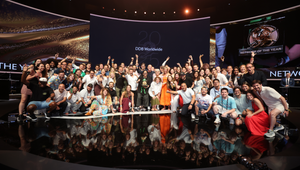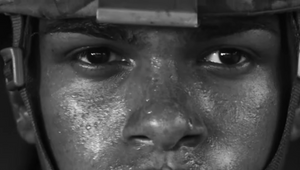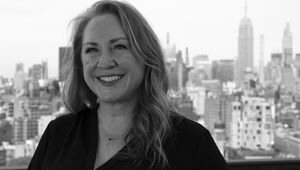
5 Minutes with… Caroline Winterton

In August 2023, Caroline Winterton became CEO of adam&eveDDB in New York; previously adam&eveNYC and DDB NY, now merged as one. She joined from Digitas, where she was president of the New York and Atlanta offices, and has previously been CEO at Barton F. Graf, and an executive or account leader at the likes of TBWA, Arnold Worldwide, Wieden + Kennedy and Ogilvy.
A self-described ‘fixer’ who doesn’t fear getting messy and hands-on alongside her team, she is also bringing her expertise to the Creative Data jury at Cannes next month.
To get an insight into Caroline’s first 10 months in the role, her approach to leadership, and how she’s navigating the agency’s future post-merger, LBB’s Ben Conway sat down with the CEO, whose beginnings may surprise you…
LBB> So, I hear you studied psychology and neuroscience, and you were an EMT? How did that come about?
Caroline> In the town that I grew up in, they have a volunteer ambulance service, it's actually pretty rigorous training. They start you at 14, answering phones and radio calls, working with the police to dispatch ambulances and stuff. If you do it well, you can mirror people in the ambulance. If you do that well, you can go into the EMT school… I loved it! I ended up working as an EMT for almost 10 years between school and all that kind of stuff. It’s probably one of the best things I've ever done, in terms of my life, my career, just as a human, because you come into people's lives at legitimately their worst moment. You never call an ambulance for fun! Something is messed up and you only have 30 seconds to listen, triage and figure out what you're going to do.
LBB> What did that experience teach you?
Caroline> It helped me be a total active listener - paying attention to what the people are saying, looking at the scene, looking at the context to understand why this person is in a bad spot, and how you can best treat them. It taught me a lot about listening, humanity, and quite honestly, empathy. This person is alone, about to have a baby, her husband is overseas… How do you connect with them? Or someone who's just lost somebody? It teaches you a lot about connecting with people. And so much of what we do in life is understanding what everybody's going through. That’s something I'll probably take to the grave with me - ‘listen first, then respond’.
So often in business, we feel like we have to have the right answer. I think it's better to actually sit back, listen and go, ‘OK, this is what this person needs’, because at the end of the day, business is about people.
LBB> So what caused the jump to marketing from there?
Caroline> A very long story short, my parents were having some super bad financial troubles. I did my first two years at school but my parents didn’t have the money to send me back. I went to this marketing company called Jay Brown in Connecticut, then a subsidiary of Grey, and they had a receptionist job. So I worked there during the day and took classes at night.
I’m sitting there at the front desk [one day], reading my neuroscience book, and the CFO Jim Plattner, who I'm still in touch with, says, ‘You're not the regular person sitting at the front desk reading People Magazine, what's your story?’. So I told him, and he's like, ‘Do you want to learn about advertising?’... Sure!
And it was honestly the best internship year of my life, it was just a year of me going, ‘I'm going to try this and then try this’ - it was the best deep dive into the kindness of people in the industry, and how the industry works - how you talk to consumers, what's going to drive action.
18 months in, Jim was like, ‘You can't just stay here forever’. So we cut a deal; ‘I'm going to work with you, give you a salary, and I'll send you projects’. I ended up getting back to Connecticut College because of those guys - I was working around the clock trying to get my degree - but they had given me a complete gift to be able to get back to school. My parents got a little bit more back on their feet and then I was able to graduate.
It was kind of the best thing that happened to me - though at that time, I thought it was the worst thing because I didn’t think I’d graduate - and I learned this crazy skill. So when I did graduate, I was like, ‘Do I want to go to medical school?’- because that was originally my goal. I didn’t have the money, so at that point, why don't I just roll the dice and try this advertising thing?
I got my foot in the door at Ogilvy - my voice is actually in an Ogilvy Motorola V60 ‘Hello Moto’ spot! I shouldn’t have signed the document to record for like $1 because I'd be a boatload richer… But then I fell in love with creative and tried going client-side. I was a terrible client. I know that sounds ridiculous!
LBB> Why were you less suited to that?
Caroline> I just felt really distant from the creative process. What I love about the agency world is that you're all in it and scrambling around, throwing ideas together. When you’re the client, everything's very pristine. The best clients do collaborate but I felt like I was too far removed from it. And my boss agreed I was better off agency-side. ‘You agree with the creatives too much!’... and I was like, ‘But they're right!’. So I went back agency-side.
LBB> What are some of the other early projects or moments where you felt you had proved yourself?
Caroline> I don’t know if I’ve ever had that in the moment. You look back and think, ‘Oh that was pretty amazing’. I remember Michael Jordan walking up to me on set when we were shooting a Jordan spot - obviously, that's a celeb star-struck moment.
But [I felt it] when I was able to turn around the Digitas New York office. When I came in, they had lost a tremendous amount of business in the three months between when I signed the contract and when I started. But I was able to turn it around.
I was always considered a fixer. Grey brought me in to save the Pringles business because it was going up for review, and the CMO of Kellogg's told our chairman there was no way we were going to win it. So we sat in the room and said, ‘OK, let's try and win it’.
I don't always know I'm walking into something broken, but I like fixing things. And those are the moments where I go, ‘OK, I feel like I've kind of made it’. However - and it's not impostor syndrome - I always feel like I can fix something else or try something bigger.
LBB> When you’re charged with fixing things, how do you go about it?
Caroline> I first took it as an insult, because I didn't really know what it meant, but my old chief of staff said: ‘You’re a servant leader’. I looked it up and actually, that’s not a bad thing! I believe that I am here to help - I am not here to run from the top. I'm here to build and be in it with the team, to win with the team and fail with the team, to cry with the team, get angry and be part of whatever the solution is. That is the core responsibility. I like to get my hands messy. I’m not scared of mess, trust me - my life has been enough of a tumultuous mess!
LBB> 10 months into this role at adam&eveDDB NY, are you finding things to fix? Why were you brought on as CEO?
Caroline> Rick [Brim, CCO], and I get along like houses on fire. He has a really wonderful vision of what he wants adam&eveDDB to be and that DNA he wants to bring to North America. Any merger has its own challenges, but breaking into North America as a newly minted creative agency is tough. It's going to come with trials and tribulations and merger messiness - figuring out what our culture is and how we get to the best creative.
There were definitely things that have been broken in past lives [here]. But I knew it was a merger, and step one: mergers are just tough.
One of the things that I've loved about working with Rick and Alex [Lubar, global president and CEO of DDB Worldwide] is that they believe if you focus on the work, all will rise. So that's what I've been focusing on, which has actually been a joy. It's less about things that are broken and more about: Who are we? What's the culture we want people to feel? What are the types of clients we want to go after that have the same creative ambition that we do? How do we make sure that we're attracting the best talent?
We're still early in, but we have eight new logos on the books, so we've been selling the proposition of adam&eveDDB in a way that is working. We won Smithfield, which is Nathan's and Eckrich - and the Nathan’s work is phenomenal. We've won some Disney projects and expanded our PlayStation roster. We have some Gatorade work. So it's awesome brands.
LBB> Are these mainly new business wins?
Caroline> Lots of new business! PlayStation is the only one of those that was on our roster - the UK office is the global AOR. We had done a couple of titles here and there, but now we are officially the agency of record for PlayStation Studios North America. What we're really focusing on is finding our position and growing, and then the next thing is getting the work out there so people see what's happening.
Year one, for me, has been less about fixing issues and more about setting the stage. It’s been fun, it’s definitely not easy. There's an energy and a vibe, and we've hired 20-plus new people. It's exciting! There will be things I have to fix at some point. Admittedly, there were a couple pieces of business where I was like, ‘I can't save those’. And it's okay. There are things that you’ve sometimes just got to let go - which to me was actually really hard because I don't like letting things go. But it’s also OK to recognise that this is the vision of the future, that [account] is a great relic of the past, and it’s OK if the future doesn't necessarily fit with the past.
LBB> How would you describe the culture of this future that you’re trying to build at the agency?
Caroline> Our focus is on creating brilliant work that works brilliantly - just simple. Let's do great stuff that's going to move the business. There’s a core focus on that, and relentlessly driving the best creative possible. But we have a no-assholes policy. I know that sounds kind of silly, but it's really important. Rick and Alex were very specific about the types of people they want to bring into this. [We need] people who will take something and run with it, and who want to be accountable. And they ultimately have to be willing to be creative, even if it makes them uncomfortable, because the best work should make you slightly uncomfortable.
And finally, just be kind! It's really about accountability, creativity and kindness.
LBB> DDB obviously has a global network, how much are you leaning into that?
Caroline> The San Francisco office is now under my remit as well, so there’s a lot of collaboration between us. We call that office ‘West’ because we've got a lot of people in LA, too. And from a global standpoint, we're trying to do many more New York-London collaborations. ‘Marmite Smugglers’ is one of our most recent examples. We don’t have Marmite as a client per se in North America, but some of the [New York] team helped come up with that idea. If we can get more and more of the New York-London duo working on full blast, I think that will help us expand even more globally.
We’re looking at it more as a micro-network, in terms of [adam&eveDDB] New York, West, London and Berlin. So there’s a lot of stuff we're doing there.
LBB> Looking back on your career so far, who shaped you into the leader you are today?
Caroline> The three people that I've learned from most are actually all my creative partners or leaders. [Barton F. Graf and slapglobal founder] Gerry Graf taught me an amazing amount just about being a good human being - classy, even through tough stuff. Tor Myhren [ex-Grey president, now VP of marketing communications at Apple] taught me a lot business-wise about how you become super strategic and still get great creative. And then Tamara Ingram [chair of The 10 Group]. She's amazing, she taught me way too much. And then I’d say Jim [Plattner] who gave me a chance when I was 18.
What goes around definitely does come around - help people and people will help you!















